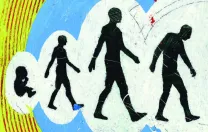The idea that mild stress might lead to health benefits is not new. In fact, the concept has a name: hormesis. Plants given low doses of an herbicide, for example, can actually become stronger and grow better. Harvard Medical School associate professor David Sinclair’s discovery that a family of plant molecules will increase longevity in yeast, roundworms, and flies made him wonder, “Why do molecules from plants extend life span? Are they just being nice to us, or is there some explanation?”
“When you look at these molecules, without exception they are produced by plants when they are stressed or starving,” he says. “We think that the plants make these molecules to turn on their own protective sirtuin genes in order to defend themselves.” Sinclair suspects that other organisms have evolved to pick up on stress signals from the plant world, using them as a chemical cue for the state of the environment. “The idea is that when our food supply is stressed out,” he explains, “we turn on our own defenses against a loss of food or other potentially adverse condition.
“Pretend there is a yeast on a grape,” he continues. “How would a yeast know if the water table of that grape vine is drying up? It wouldn’t, unless it could pick up on the plant chemicals that the grape is producing in response.” If the yeast does sense the grape’s chemical messages, then it might, “two weeks in advance, start hunkering down and building its own resources to get ready for the adversity that is about to come.”
Maybe that is why we love organically grown fruits, Sinclair speculates. Because they haven’t been chemically protected from insects and disease, “They’re stressed out, they are full of these compounds. We know they are good for our health, just based on thousands of years of evidence, but no one really knows why.”
If Sinclair’s theory—which he calls xenohormesis—is correct, it would explain why so many of our medicines come from the plant world, and why they seem to be “almost miraculous.” Aspirin, for example, cures headache, dulls pain, and even prevents heart attacks. “All the molecules in the aspirin family come from plants,” notes Sinclair. “Could it be that we have evolved to pick up on those?”
To test the hypothesis, one of his graduate students, Natalie Arkus, is working with professor of genetics Frederick Ausubel to compare the longevity of aphids feeding on stressed and unstressed groups of the mustard plant Arabadopsis thaliana. Under the mild stress of excessive light, the plants produce sirtuin-activating compounds (STACs) that turn the leaves purple; the leaves of unstressed plants remain green. “We predict that aphids feeding on the stressed plants will live longer,” says Sinclair. If he’s right, it would not only place humans and other species squarely in a broader ecological context, it would mean that the place to look for new medicines is in stressed plants, rather than in well-cared-for specimens.





